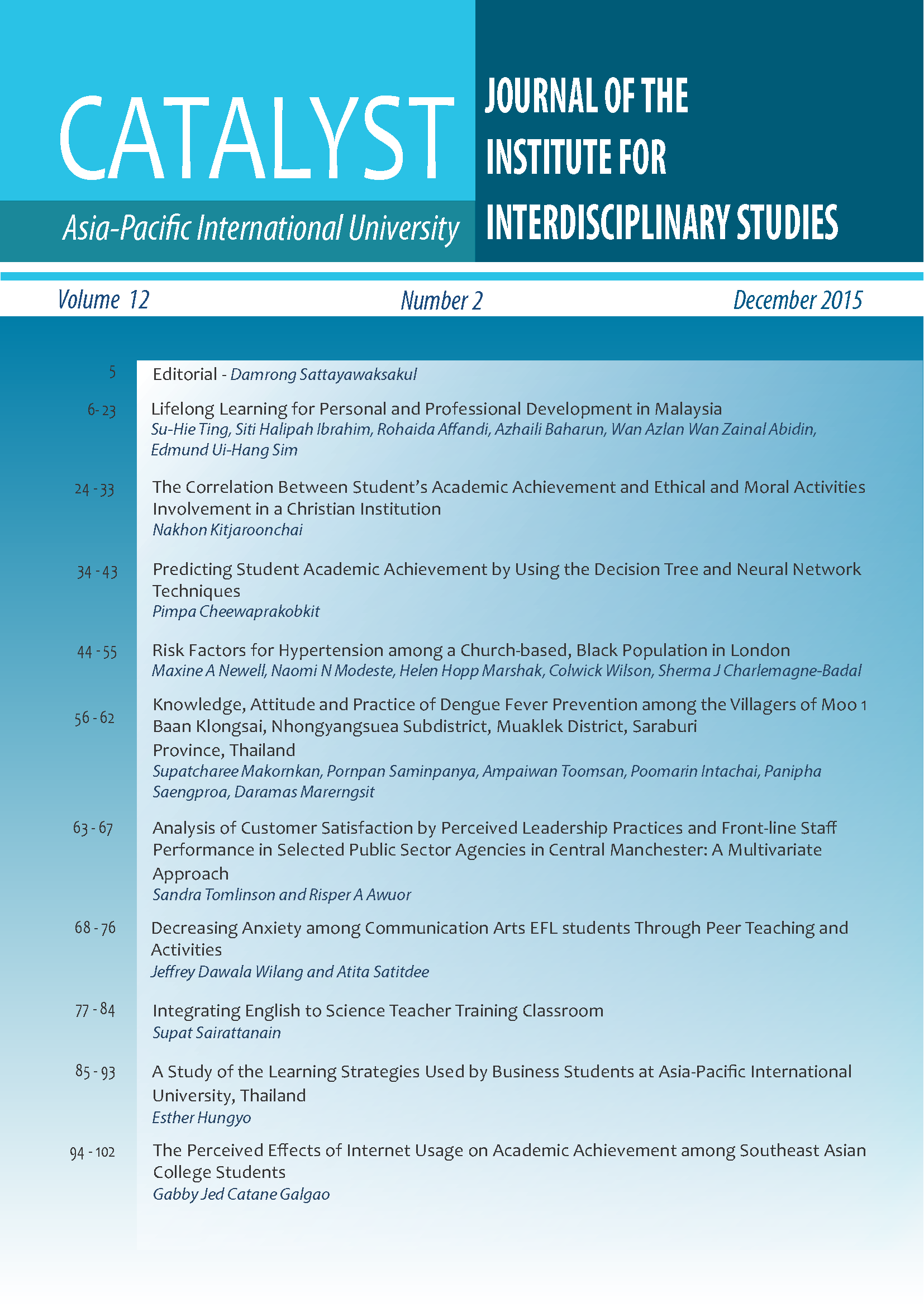Integrating English to Science Teacher Training Classroom
Main Article Content
Abstract
This study was aimed determining the attitudes of student-teachers towards the integration of English in science education. With the impending ASEAN Community of 2015, the Institute for the Promotion of Teaching Science and Technology in Thailand initiated the campaign of combining English usage with scientific tasks. The subjects of this study were forty students, enrolled in the faculty of education, majoring in Science education at Sisaket Rajabhat University, a teacher training institution in the Northeastern part of Thailand. The subjects were assigned to do projects related to science experimentation, and also present their experiments in English. Prior to their presentations, they were trained how to present projects in English. Data were collected by questionnaires, which aimed to determine their attitudes towards the integration of English into their science project presentations, and to compare different strategies used to complete the task. Students were also interviewed after completing the questionnaire. The results stated that the majority of student-teachers considered integrating English in science as very challenging as they needed to practice how to deliver both accurate science content and comprehensible English. Nonetheless, all of the subjects realized how important it is for them as future science teachers to teach in English. Hence, they were willing to practice more with a positive attitude. These findings can be used as guidelines for a teacher training institution to further enhance the integration of English in subject matters.
Article Details

This work is licensed under a Creative Commons Attribution-NonCommercial-NoDerivatives 4.0 International License.
Copyright: Asia-Pacific International University reserve exclusive rights to publish, reproduce and distribute the manuscript and all contents therein.
References
Chou, M.-h. (2011). The influence of learner strategies on oral presentations: A comparison between group and individual performance. English for Specific Purposes, 30(4), 272-285. doi: http://dx.doi. org/10.1016/j.esp.2011.04.003
De Segovia, L. P., & Hardison, D. M. (2009). Implementing education reform: EFL teachers’ perspectives. ELT journal, 63(2), 154-162.
Foley, J. A. (2005). English in… Thailand. RELC journal, 36(2), 223-234.
Geringer, J. (2003). Reflections on professional development: toward high-quality teaching and learning. Phi Delta Kappan, 84(5), 373-380.
Holmes, H., Tangtongtavy, S., & Tomizawa, R. (1995). Working with the Thais: A guide to managing in Thailand: White Lotus Bangkok,, Thailand.
Israsena, V. (2007). Thai Teachers’ Beliefs about Learner-centered Education: Implications for” Success for Life Thailand”: ProQuest.
Noom-Ura, S. (2013). English-Teaching Problems in Thailand and Thai Teachers’ Professional Development Needs. English Language Teaching, 6(11).
Noopong, D. (2002). English teaching problems and the needs for professional development of teachers of english in education extended schools under the jurisdiction of the office of primary education. Nakorn Ratcasima Rajabhat University.
Sanprasert, N. (2010). The application of a course management system to enhance autonomy in learning English as a foreign language. System, 38(1), 109-123. doi: http://dx.doi.org/10.1016/j.system.2009.12.010
Sheets, B. H., & Tillson, L. (2007). Strategies To Improve Students’ Presentation Skills.
Tatzl, D. (2011). English-medium masters’ programmes at an Austrian university of applied sciences: Attitudes, experiences and challenges. Journal of English for Academic Purposes, 10(4), 252-270. doi: http:// dx.doi.org/10.1016/j.jeap.2011.08.003
Wiriyachitra, A. (2002). English language teaching and learning in Thailand in this decade. Thai TESOL focus, 15(1), 4-9.
Yang, A., & Lau, L. (2003). Student attitudes to the learning of English at secondary and tertiary levels. System, 31(1), 107-123. doi: http://dx.doi.org/10.1016/S0346-251X(02)00076-3
Yang, A., & Lau, L. (2003). Student attitudes to the learning of English at secondary and tertiary levels. System, 31(1), 107-123.


